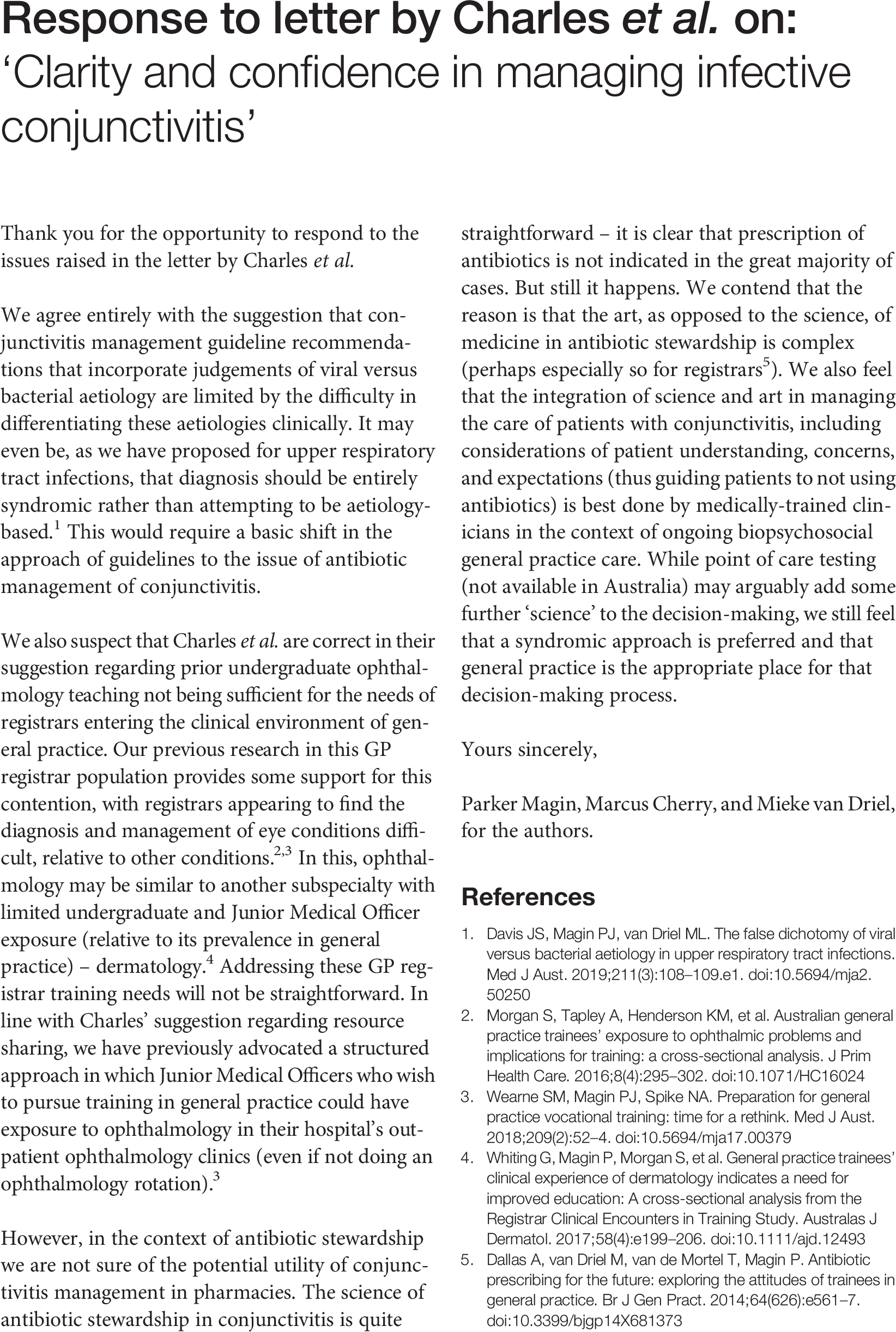Clarity and confidence in managing infective conjunctivitis
Roselin C. Charles 1 † , Hong Kai Lim 2 4 † , Walton N. Charles 31 Department of Ophthalmology, Torbay Hospital, Torquay, UK.
2 Oxford University Clinical Academic Graduate School, University of Oxford, Oxford, UK.
3 Department of Surgery and Cancer, Imperial College London, London, UK.
4 Corresponding author. Email: hongkai.lim@doctors.org.uk
Journal of Primary Health Care 13(2) 121-123 https://doi.org/10.1071/HC21042
Published: 29 June 2021
Journal Compilation © Royal New Zealand College of General Practitioners 2021 This is an open access article licensed under a Creative Commons Attribution-NonCommercial-NoDerivatives 4.0 International License
We read with interest the large cross-sectional analysis by Cherry et al. of prescribing patterns for infective conjunctivitis.1 Concerningly, the authors report that antibiotics were prescribed in 74% of new cases. The over-prescription of antibiotics for this largely self-limiting condition also occurs in the UK.
Evidence-based guidelines consistently advocate against routine antibiotic prescribing, which demonstrate only modest benefit in bacterial conjunctivitis.2 Unfortunately, guidelines that primarily base management on aetiology being viral or bacterial, such as those reported by the authors, are limited by the difficulty in differentiating these clinically.2
This difficulty is complicated by the suboptimal teaching of ophthalmic clinical skills in medical school, as reported by a recent national survey.3 The finding by Cherry et al. that fewer senior registrars prescribed antibiotics supports this. Although longitudinal changes in trainee prescriptions were not investigated, the authors highlighted how ophthalmic presentations may be particularly challenging for junior general practice (GP) registrars, who have less ophthalmology exposure. Resource sharing between professional organisations may improve ophthalmology’s presence in training curricula and so establish rational prescribing habits at an earlier stage.
In the UK, the Royal College of General Practitioners recommends delayed antibiotic prescribing for 3 days unless indicated otherwise by red flags.2 A delayed strategy reduces antibiotic use and patient reattendance while offering symptom management comparable to immediate prescribing.4 Microbiological assumptions based on limited clinical information are not necessary.
Even so, cost-effective point-of-care testing for viral or bacterial organisms may be the only way to tackle diagnostic uncertainty. This is currently recommended for severe and atypical cases but its utility is somewhat limited in routine practice due to a lack of perceived impact on disease course or management.2 If this were to improve, it may be possible to replicate the framework currently in place for simple urinary tract infections, namely Pharmacy First.5 Low-risk patients can be tested and treated at selected pharmacies thereby reducing the burden on general practice. Studies further evaluating this are warranted.
Overall, although prudent antibiotic prescribing is high on the public health policy agenda, antibiotics continue to be used injudiciously despite the evidence advocating otherwise. This study highlights important contextual factors relating to GPs’ antibiotic prescribing habits and identifies scope for further investigation.
Greater clarity in guidelines and confidence in prescribing, or lack thereof, will be fundamental in improving suboptimal rates of antibiotic prescription for infective conjunctivitis.
Competing interests
The authors declare no competing interests.
Funding
This research did not receive any funding.
Acknowledgement
Not applicable.
References
[1] Cherry MD, Tapley A, Quain D, et al. Antibiotic prescribing patterns of general practice registrars for infective conjunctivitis: a cross-sectional analysis. J Prim Health Care. 2021; 13 5–14.| Antibiotic prescribing patterns of general practice registrars for infective conjunctivitis: a cross-sectional analysis.Crossref | GoogleScholarGoogle Scholar | 33785106PubMed |
[2] Royal College of General Practitioners. Management of Infective Conjunctivitis in primary care. [cited 2021 April 1]. Available from: https://www.rcgp.org.uk/-/media/Files/CIRC/Eye-Health/RCGP-Infective-Conjunctivitis-Factsheet-December-2014.ashx?la=en.
[3] Hill S, Dennick R, Amoaku W. Present and future of the undergraduate ophthalmology curriculum: a survey of UK medical schools. Int J Med Educ. 2017; 8 389–95.
| Present and future of the undergraduate ophthalmology curriculum: a survey of UK medical schools.Crossref | GoogleScholarGoogle Scholar | 29103017PubMed |
[4] Everitt HA, Little PS, Smith PW. A randomised controlled trial of management strategies for acute infective conjunctivitis in general practice. BMJ. 2006; 333 321
| A randomised controlled trial of management strategies for acute infective conjunctivitis in general practice.Crossref | GoogleScholarGoogle Scholar | 16847013PubMed |
[5] National Health Service Inform. Urinary tract infection (UTI). [cited 2021 April 1]. Available from: https://www.nhsinform.scot/illnesses-and-conditions/kidneys-bladder-and-prostate/urinary-tract-infection-uti.
† These authors contributed equally to this work.



